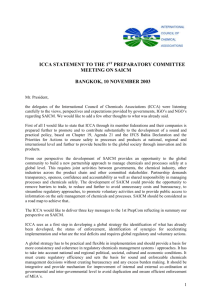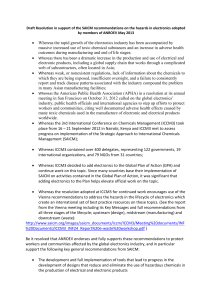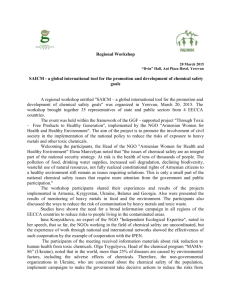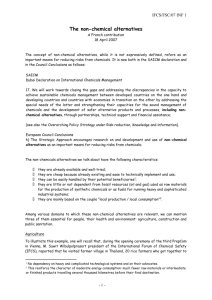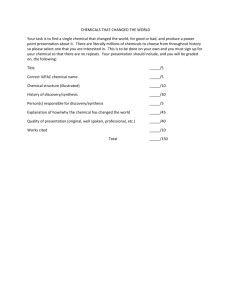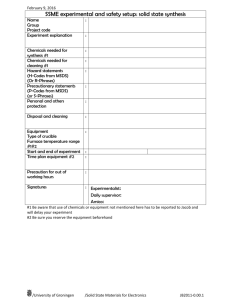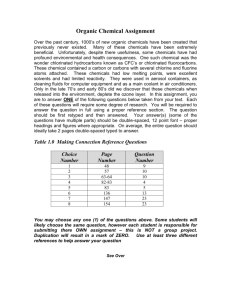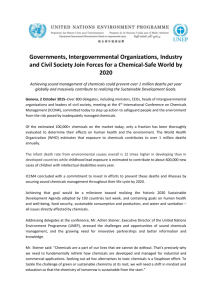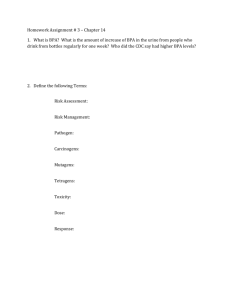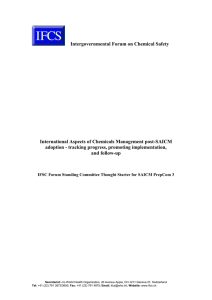addressing the widening gap among countries in following chemical
advertisement
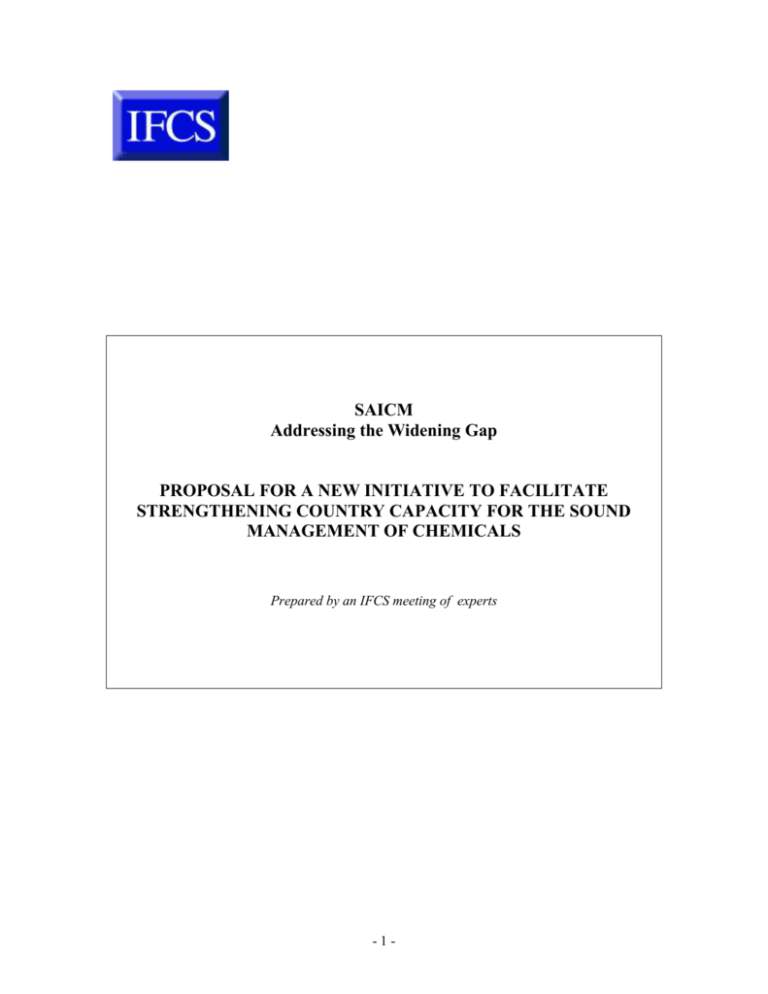
SAICM Addressing the Widening Gap PROPOSAL FOR A NEW INITIATIVE TO FACILITATE STRENGTHENING COUNTRY CAPACITY FOR THE SOUND MANAGEMENT OF CHEMICALS Prepared by an IFCS meeting of experts -1- SAICM Addressing the Widening Gap PROPOSAL FOR A NEW INITIATIVE TO FACILITATE STRENGTHENING COUNTRY CAPACITY FOR THE SOUND MANAGEMENT OF CHEMICALS Prepared by an IFCS meeting of experts The draft SAICM Concrete Measures includes as an activity under Objective 4 : Capacity building to support national actions: Establish and implement a process for provision of advice on the systematic implementation of the activities at national level to achieve the SAICM objectives as delineated by the concrete measures. Such a "process" can provide essential support for the overall implementation of SAICM and thus may be considered as a high priority activity. The Fourth Session of the Intergovernmental Forum on Chemical Safety (Forum IV) considered the issue of the widening gap between developed countries and developing countries in their ability to pursue chemical safety policies. It recommended that a systematic1process to strengthen the sound management of chemicals in countries with an expressed need be implemented. The development and implementation of the process is to be done in active partnership with those working in the area and will enhance their on-going efforts. The Forum Standing Committee (FSC), mandated by Forum IV to decide on the modalities for the process, convened a meeting of experts to prepare a proposal for the process. This paper presents the outcome of the expert group’s deliberations. It presents a proposal for the establishment and implementation of the "process" called for in the draft SAICM Concrete Measures as part of the SAICM institutional arrangements. The proposal suggests functions and working methods as well as an initial pilot project. The PrepCom is requested to consider the proposal and, if found to have merit, it is recommended that accommodation for the process be made in the SAICM institutional arrangements and further work to elaborate the proposal including the development of an initial pilot project for its implementation be undertaken between PrepCom3 and the International Conference on Chemicals Management (ICCM). 1 "Systematic" was interpreted broadly by the Forum Standing Committee to include flexible approaches to meet a wide range of country needs. -1- 1. INTRODUCTION The IFCS Forum IV meeting recommended that a process to strengthen efforts to address the widening capacity gap between developed and developing countries should be developed.2 The IFCS convened an Expert Group meeting in July 2005, comprised of a broad range of stakeholders, to further elaborate such a process. Representatives of several Inter-Organization Programme for the Sound Management of Chemicals (IOMC) participating organisations attended this meeting as observers. The Forum Standing Committee (FSC) requested that the Expert Group undertake the development and implementation of the process in active partnership with those working to build capacity for the sound management of chemicals, and to enhance their ongoing efforts. Since this Forum IV recommendation was made, the work to further develop a strategic approach to international chemicals management (SAICM) has evolved substantially. As such, the Expert Group determined that its work should respond to these developments. The SAICM documents were, therefore, used as a basis for the elaboration of this proposed new initiative. Specifically, the Expert Group meeting undertook the task of providing advice on the SAICM Concrete Measure capacity building activity to “Establish and implement a process for provision of advice on the systematic implementation of the activities at the national level to achieve the SAICM objectives as delineated by the concrete measures.”3 2. BACKGROUND The Expert Group noted with appreciation the major efforts of the international community, donors, and intergovernmental organizations (IGOs) in capacity building activities. These activities provide a valuable resource to countries who need assistance in building their capacity to manage chemical safely. However, notwithstanding these efforts, the gap in the capability for sound management of chemicals is widening. 4 This reinforces the need for a new process to facilitate the strengthening of chemicals management in developing countries and countries with economies in transition. Another challenge facing all countries is the need to integrate chemical safety issues into broader development strategies and to achieve the Millennium Development Goals. The proposal below seeks to complement and support the activities of international organizations, donor agencies, and others to strengthen capacity building for the sound management of chemicals, including the capacity to further integrate chemicals management into development strategies. 2 Fourth Session of the IFCS, Bangkok, Thailand, 1-7 November 2003, Final Report, Executive Summary, Addressing the Widening Gap Among Countries in Following Chemical Safety Policies, IFCS/ForumIV/16w. http://www.who.int/ifcs/Forums/ForumIV/FIVreport.htm 3 SAICM Global Plan of Action (containing the concrete measures) SAICM/PREPCOM.3/4. http://www.chem.unep.ch/saicm/prepcom3/Default.htm 4 Addressing the Widening Gap Among Countries in Following Chemical Safety Policies, Prepared by: Forum Standing Committee Working Group, Chaired by the Islamic Republic of Iran, IFCS/Forum-IV/12w, 28 April 2003. http://www.who.int/ifcs/Forums/ForumIV/Meet_docs.htm 3. STRENGTHENING CAPACITY BUILDING EFFORTS The Expert Group proposes a new process to facilitate the provision of advice concerning capacity building for the sound management of chemicals at the country level, in support of SAICM objectives. The funding and institutional elements of this process should be further elaborated after PrepCom 3 has developed more detailed text on funding and institutional arrangements for SAICM, and how guidance would be provided to countries for the implementation of SAICM. The overall objective of this process would be to further empower countries in the sound management of chemicals. The process would operate and build on existing capacity building principles such as ownership, engaging stakeholders, building on synergies and sustainability beyond intervention, within a framework of sustainable development. This process should include, as a first step, a Help Desk which provides basic advice to countries and/or referral of requests to relevant sources (policy institutions, experts, data banks, information, etc.) of expertise, policy guidance, funding and guidelines. The development of a second component in the process should also be considered, for responding to more complex requests. In addition, as experience accumulates, tools could be developed to facilitate responses to the most frequently asked questions. Information to respond to a request could be obtained from existing information sources such as Information Exchange Network on Capacity Building for the Sound Management of Chemicals (INFOCAP), the IOMC inventory of activities, local offices and country desks, or websites of bilateral and multilateral donors and other international and regional agencies. The response to a request could involve referral to IOMC organizations; referral to other international or regional agencies; referral to donor countries; and/or or direct provision of advice on the problem posed. The process could include provision of advice on issues such as: identification and prioritization of chemical safety issues requiring immediate attention; accessing available chemical safety programmes and activities of international organisations and conventions; accessing available funding opportunities; accessing information on best practices; synergies between national work and ongoing regional or subregional activities; tools and entry points for linking chemicals management to major development issues, and goals, such as the Millennium Development Goals; guidance and tools for enhancing sustainability of already achieved capacity for chemicals management at the national level; organisational management and development; undertaking a gap analysis with national authorities; The Expert Group considered it essential that the Help Desk be accessible, with few conditions for requesting advice. For example, to submit a Help Desk enquiry may require only a written request. A second component in the process, to respond to more complex requests, may require more formal procedures, such as a standardized request format, and threshold criteria, for example, endorsement by the national focal point and/or the establishment of a SAICM interministerial/multi-stakeholder committee/body. Further elaboration of the process should also involve the establishment of operating procedures for matters such as: responding to requests and prioritizing requests for response; providing guidance on how to link chemicals management with the Millennium Development Goals; providing guidance on how to identify underlying causes of gaps; identifying opportunities for regional and sub-regional cooperation; identifying opportunities for synergies with other conventions and international initiatives; identifying opportunities for leveraging funds, in addition to chemical funds; determining the need for country visits/meetings; use of experts and relevant criteria.5 4. MONITORING and EVALUATION Monitoring and evaluation should be carried out under the SAICM oversight functions and linked to the Millennium Development Goals, and other related goals. Monitoring parameters could include analysis of the type of requests received, feedback from countries that have received assistance, the level of success in integrating chemical management issues in development strategies, and lessons learnt. Countries receiving assistance through this initiative would be encouraged to report on progress. 5. WAY FORWARD The Expert Group invites PrepCom 3 to consider the proposal with a view to incorporating it in the SAICM document, as appropriate. Should PrepCom 3 agree that the process outlined could be useful in SAICM implementation, it is recommended that accommodation for the process be made in the SAICM institutional arrangements and further work to elaborate the proposal including the development of an initial pilot project for its implementation be undertaken between PrepCom3 and the International Conference on Chemicals Management (ICCM). This would include the development of the criteria, procedures and required expertise and resources for this process. An additional area needing special attention is the integration of chemicals management in the broader development agenda, including efforts to achieve the Millennium Development Goals and contribute to Poverty Reduction Strategies. The Expert Group considered that a pilot project could be included in the SAICM implementation plans to delineate where chemical management issues are an inherent part of development and how work to improve chemicals management capacities can be incorporated into development assistance strategies, sustainable development strategies, and poverty reduction strategies. 5 The inclusion of this item was not support by two observers.
